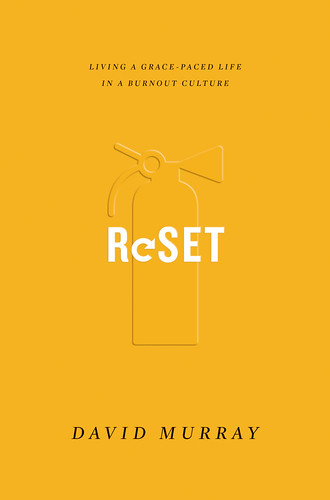Reset: living a grace-paced life in a burnout culture
David Murray
Crossway, 2017

Being at a gathering of pastors from many different theological backgrounds this week reinforced to me that burnout is an issue faced by those in all flavours of Christian ministry. Last year’s big book on burnout was by an Englishman (Christopher Ash – Zeal without Burnout), this year’s is by a Scot (now an American citizen). While Ash’s book was solely aimed at those in ministry, Murray tries to aim at a wider constituency (men in general – he and his wife are bringing out a book for women later in the year).
The book is well-structured, and follows a series of ten ‘repair bays’ that Murray has used when walking through this process with others. As well as being helpful in and of itself, Murray’s system would be a good guide to use to help others through burnout.
For those who’ve followed Murray’s writing, it’s a familiar mix of Scripture, personal examples and scientific/medical research – he argues that the sufficiency of Scripture means that we don’t need any more special revelation, not that we should shun every nonbiblical source of knowledge.
Murray uses a lot of examples of things he does in his own life, some of which I found helpful and some of which I didn’t. Living a life as regimented as his may help him in his battle with burnout, but I found it exhausting just reading about it. Like Ash, he also just talks about the Sabbath as a pattern rather than a specific day. This is perhaps understandable when writing for those ministering on Sundays – then again, as Paul Levy noted recently ‘I’m not convinced there’s an exemption for ministers’.
If you were just to read one book on burnout, I would recommend Ash’s. It’s more concise, less prescriptive and brings out a helpful theme that Murray doesn’t stress – those who are burnt out may well not realise it. Having said that, burnout is a common enough and serious enough issue that there’s no need to limit yourself to one book. If you enjoy Murray’s writing, you’ll enjoy this.
To close, here are some great lines if you don’t fancy reading all 200 or so pages (most of the first person examples aren’t from Murray himself):
– ‘When and how long we sleep makes a huge statement about who we are and what we believe about God’
– ‘digital technology is one of the greatest impediments to a life spent in communion with God’
– ‘Pascal: “All our miseries derive from not being able to sit in a quiet room alone [with God]”. We’d like it to be different. But as Psalm 46 confirms, God has inseparably and irrevocably joined quietness with knowledge of him.’
– ‘Two minutes of silence are more relaxing than listening to music…Experiments on mice found that two hours of daily silence produced new brain cells in the area of the brain associated with learning, memory and emotion’
– ‘If we do not allow for a rhythm of rest in our overly busy lives, illness becomes our Sabbath’
– It’s not “Rest when you have nothing to do”, but “Rest because you will never be done”
– ‘We’re not really relaxing if we’re still emailing every day or preaching on the weekend’
– A couple of good scenarios of where people find their identity in chapter 6: Seth attends a church where important doctrines are ‘only postscripts to lengthy tirades about what’s wrong with people, the church, and the world. He has little or no sense of God’s love or of being God’s child… His children dread family devotions…’
– ‘The worst thing that happened to me in ministry was when I forgot who I was in Christ. The second worst thing was when I tried to make what I did as a pastor fill that void’
– ‘What happens if I lose my job, retire, or if my job does not go well? I lose my identity’.
– ‘Learning to fail well is a vital part of the Christian life’
– ‘My failures may have been painful, but unbroken success would have been deadly’
– ‘My failures have drained my sinful self-confidence and filled me with sympathy for others’
– ‘For Christians, our best days are ahead of us’
– ‘A denial of the existence of mental disorders is essentially a denial of biblical anthropology in that it is a denial of the extensive, damaging effects of the fall upon our whole humanity’
– ‘Of all the things that can boost emotions, motivation, and perceptions during a workday, the single most important is making progress in meaningful work’
– ‘Would you accept a “successful” job (or ministry) at the cost of a happy marriage?’
– ‘The best decision I ever made was to pull back from ministry and reconnect with my family. It may be one of the few things I have done for which I have no regrets’
– ‘I have never regretted saying “I’m sorry” to my children.
– ‘Contentment in ministry is a secret of endurance in ministry. Pastors must learn to be content with what hand God has dealt them’.
– ‘When we live a grace-based life, we not only receive more grace, we give more grace’
Thanks to Crossway for a complimentary copy of this book through their Beyond the Page review programme.